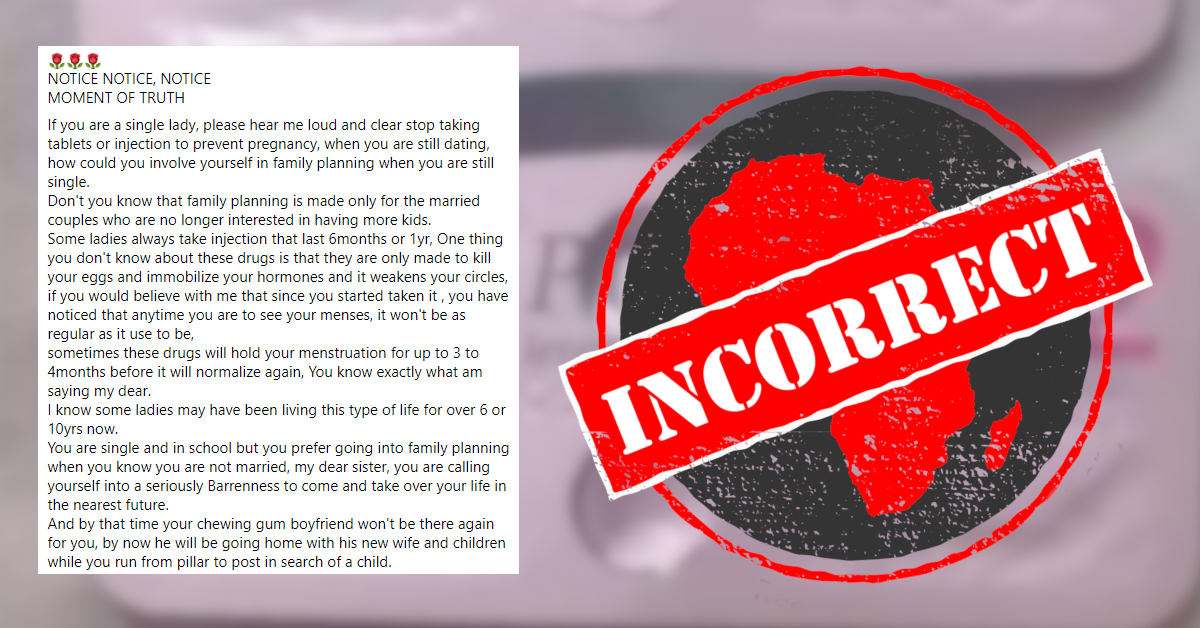A Facebook post published in Nigeria in August 2019 and shared more than 500 times claims the “most effective and easiest method of testing pregnancy by pregnant women” is a “salt pregnancy test”.
Headlined “Pregnancy test with salt or white toothpaste at home”, the post explains how to make homemade pregnancy tests using salt or toothpaste.
It was posted on a Facebook group that claims to be a forum for learning about “women related issues, family, sexology and how to care & pamper your skin”.

Two specialists told Africa Check that its instructions for homemade pregnancy tests were not founded in science.
Dr Bolanle Okesina, a consultant obstetrician-gynaecologist at the Kwara State Specialist Hospital in Ilorin, Nigeria, said that the claim that one can do a salt pregnancy test is not correct.
“That claim has not been scientifically proven. I believe a woman can go for blood test to confirm if she is pregnant or not. Pregnancy tests have nothing to do with salt.”
Dr Kingsley Ekwuazi, a consultant obstetrician and gynaecologist at the University of Nigeria, said the claim about using toothpaste to test for pregnancy makes no sense medically.
“The claim sounds untrue to me. It has not been scientifically proven. I wouldn’t advise any woman to test for pregnancy using toothpaste.”
Medically approved pregnancy tests detect the different forms of human chorionic gonadotropin (hCG), also known as the pregnancy hormone. There is no evidence that salt or toothpaste detect hCG. – Motunrayo Joel
Headlined “Pregnancy test with salt or white toothpaste at home”, the post explains how to make homemade pregnancy tests using salt or toothpaste.
It was posted on a Facebook group that claims to be a forum for learning about “women related issues, family, sexology and how to care & pamper your skin”.

Claims not scientifically proven
Two specialists told Africa Check that its instructions for homemade pregnancy tests were not founded in science.
Dr Bolanle Okesina, a consultant obstetrician-gynaecologist at the Kwara State Specialist Hospital in Ilorin, Nigeria, said that the claim that one can do a salt pregnancy test is not correct.
“That claim has not been scientifically proven. I believe a woman can go for blood test to confirm if she is pregnant or not. Pregnancy tests have nothing to do with salt.”
Dr Kingsley Ekwuazi, a consultant obstetrician and gynaecologist at the University of Nigeria, said the claim about using toothpaste to test for pregnancy makes no sense medically.
“The claim sounds untrue to me. It has not been scientifically proven. I wouldn’t advise any woman to test for pregnancy using toothpaste.”
Medically approved pregnancy tests detect the different forms of human chorionic gonadotropin (hCG), also known as the pregnancy hormone. There is no evidence that salt or toothpaste detect hCG. – Motunrayo Joel
Republish our content for free
For publishers: what to do if your post is rated false
A fact-checker has rated your Facebook or Instagram post as “false”, “altered”, “partly false” or “missing context”. This could have serious consequences. What do you do?
Click on our guide for the steps you should follow.
Publishers guideAfrica Check teams up with Facebook
Africa Check is a partner in Meta's third-party fact-checking programme to help stop the spread of false information on social media.
The content we rate as “false” will be downgraded on Facebook and Instagram. This means fewer people will see it.
You can also help identify false information on Facebook. This guide explains how.





Add new comment